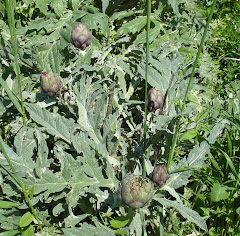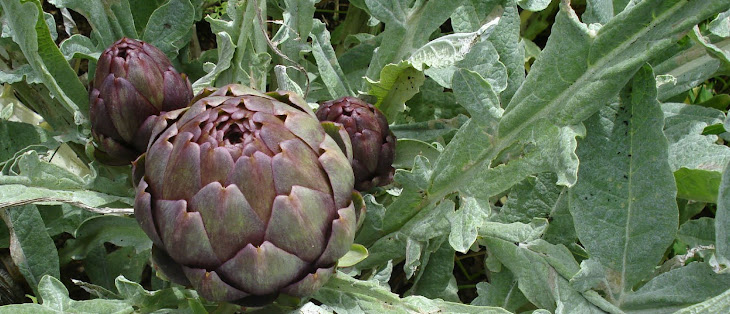This is a traditional sweet bread made in the Languedoc and in Provence at this time of the year - la pòmpa a l'òli (literally ‘the oil pump’).
It is made with olive oil and orange flour water so it has a wonderful flavour and smells delicious when it is being baked. I used: 400 gm flour, 100 gm sugar, 80 gm olive oil, a tablespoon of orange flower water, 8 gm dried yeast, the grated peel of an orange, a small glass of warm water and a pinch of salt. Mix all the ingredients together and knead, as for bread, then leave the ball of dough in a bowl covered with a tea towel in a warm place until it has doubled in size – it can take several hours. Form the dough into two round flat loaves, about 2 cm high and bake in a hot oven – 200 degrees C – for about fifteen minutes, watching it carefully to make sure it doesn’t burn. Take out of the oven and allow to cool on a rack.
The tradition is that this bread must always be broken – cutting it with a knife will bring bad luck in the year to come!
Los tretze dessèrts
La pòmpa a l'òli is traditionally served with los tretze dessèrts (the thirteen desserts) during the Christmas and New Year celebrations. The thirteen desserts are: walnuts, dried figs, almonds, raisins, quince paste, white grapes, melon, candied citrus peel, apples, pears, plums, white nougat and black nougat (made with caramelised sugar). These are all presented on the same table and are eaten with the fingers, accompanied by pieces of the pòmpa a l'òli and sweet or fortified wine.
POLIDAS FESTAS! – HAPPY HOLIDAYS!









7 comments:
What is orange flour water? I'm trying to think if I've ever seen anything in American shops that might be this ingredient, but by a different name.
@ Lisa and Robb: sorry, I mis-spelt it - it's orange flower water, a distillation of orange blossoms, see this link: http://food.qandas.com/approved-queue/what-is-orange-flour-water-where-would-i-purchase-it.html
hope that helps!
I can imagine how wonderful that smells and tastes with the orange peel and the flower water. Is there a significance to having 13 desserts?
I love that bread which uses ingredients that are native to our region as well! I am sure there is a significance to the 13 desserts, I will look into it and find out (maybe the number of the apostles?) anyway, this is a great post. Happy holidays.
@ tasteofbeirut: yes, I think the 13 did originate with the idea of Christ and the 12 apostles.
I have heard of this bread using olives, as well as olive oil. Sounds delicious.
By now I should know better than to visit you when I'm hungry. Your bread looks delicious. Your recipe style reminds me of how Niki Segnit described her lovely book, "The Flavor Thesaurus".
She said: "I've given any recipes in the briefest possible terms... compressed in the expectation that you have some experience in the kitchen. I've assumed you know to... turn off the stove when you're finished, and fish out any ingredients that might choke your loved ones."
I wish you and your family a magnificent new year, abundant with life and growth, and harvests rich with food and friends.
Post a Comment